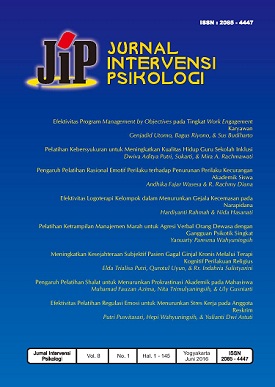Main Article Content
Abstract
This study aims to determine the effect of the Rational Emotive Behavior Training to reduce academic cheating behavior in students. Subjects in this study were ten students aged 13-15 years and have academic cheating behavior score from moderate to high. The design used was one group pretest-posttest. Collecting data in this study was conducted using a scale of academic cheating compiled by researchers. Data analysis method used is non-parametric statistical techniques by using Wilcoxon Signed-Rank Test to test for differences in the data score pre test and post test. Results of the analysis showed the value of Z when the post test for - 677a with p equal to 0,498. It can be concluded that the training of Rational Emotive Behavior (REBT) is not effectively used to derive academic cheating behavior in students in junior high school "X" in Yogyakarta.
Keywords: Rational Emotive Behavior Training, Academic cheating behavior
Article Details
Authors who publish with this journal agree to the following terms:
- Authors retain copyright and grant the journal right of first publication with the work simultaneously licensed under a Creative Commons Attribution-ShareAlike 4.0 International License that allows others to share the work with an acknowledgment of the work's authorship and initial publication in this journal.
- Authors are able to enter into separate, additional contractual arrangements for the non-exclusive distribution of the journal's published version of the work (e.g., post it to an institutional repository or publish it in a book), with an acknowledgment of its initial publication in this journal.
- Authors are permitted and encouraged to post their work online (e.g., in institutional repositories or on their website) prior to and during the submission process, as it can lead to productive exchanges, as well as earlier and greater citation of published work (See The Effect of Open Access).




